Ethical Nursing: Analysis of Clinical Scenarios and Ethical Principles
VerifiedAdded on 2022/09/23
|6
|1521
|42
Essay
AI Summary
This essay examines ethical dilemmas in nursing through the analysis of four clinical scenarios. The first scenario explores the application of the four ethical principles—beneficence, non-maleficence, justice, and autonomy—in the context of a burn patient's care. The second scenario focuses on a 13-year-old girl seeking an HPV vaccination, addressing the ethical considerations related to autonomy, beneficence, and parental consent. The third scenario presents a case of selecting a patient for a CMP program, applying ethical theories such as deontological and utilitarian ethics. The fourth scenario critiques the actions of nurses in a case of euthanasia, highlighting the violation of ethical principles. The essay provides a detailed analysis of each scenario, identifying ethical issues, and discussing the application of ethical principles and theories to guide decision-making in nursing practice. References are provided for each point made in the essay.
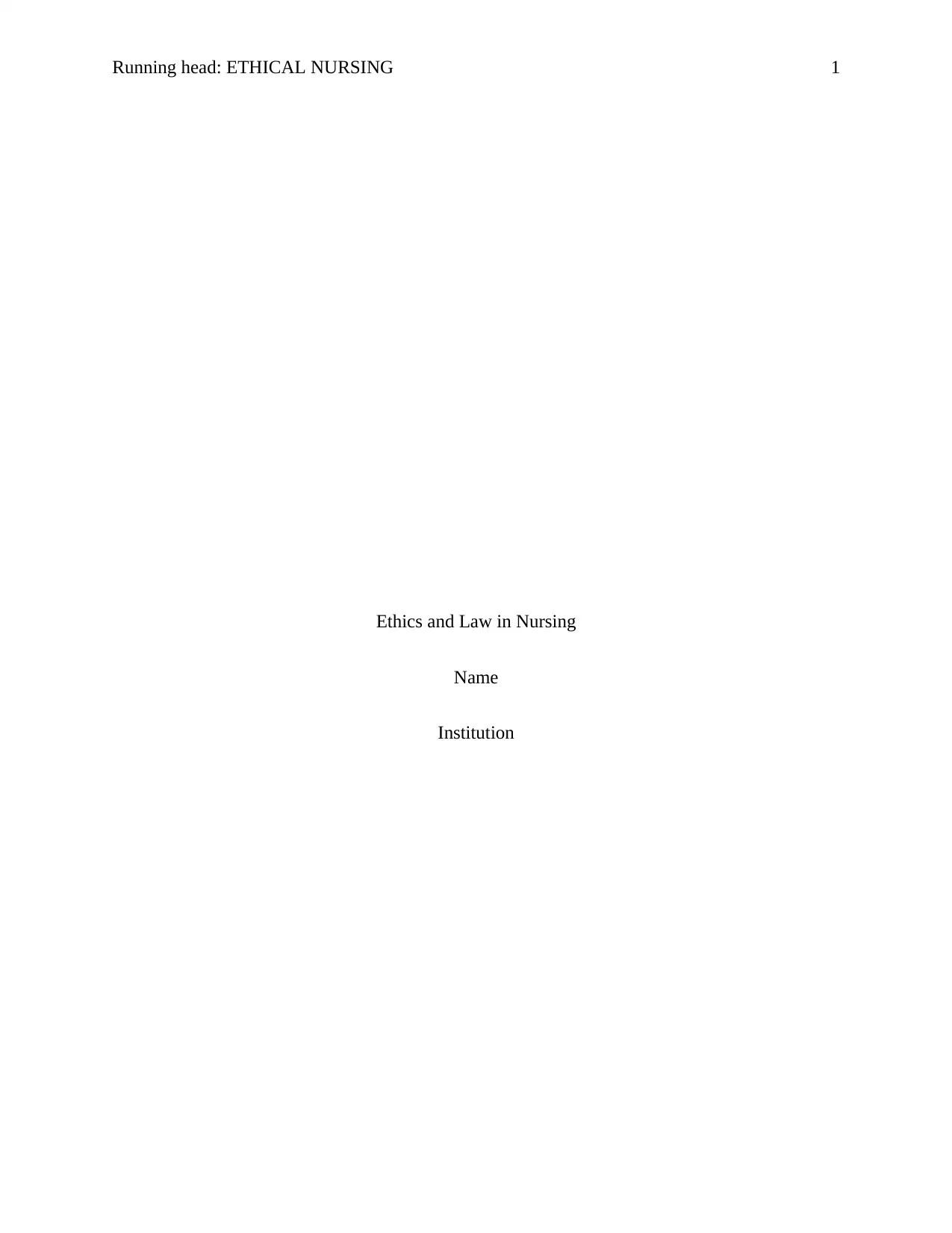
Running head: ETHICAL NURSING 1
Ethics and Law in Nursing
Name
Institution
Ethics and Law in Nursing
Name
Institution
Paraphrase This Document
Need a fresh take? Get an instant paraphrase of this document with our AI Paraphraser
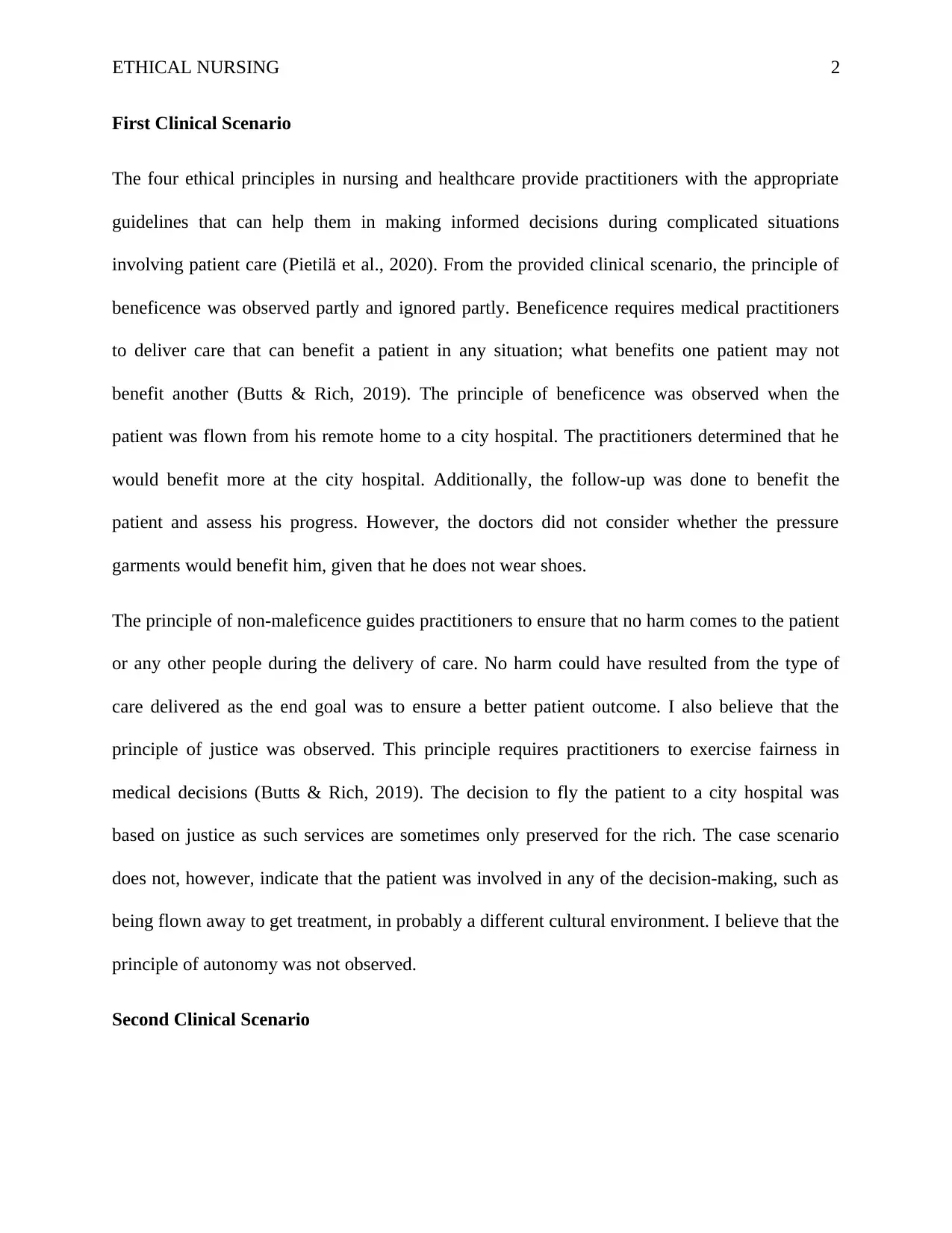
ETHICAL NURSING 2
First Clinical Scenario
The four ethical principles in nursing and healthcare provide practitioners with the appropriate
guidelines that can help them in making informed decisions during complicated situations
involving patient care (Pietilä et al., 2020). From the provided clinical scenario, the principle of
beneficence was observed partly and ignored partly. Beneficence requires medical practitioners
to deliver care that can benefit a patient in any situation; what benefits one patient may not
benefit another (Butts & Rich, 2019). The principle of beneficence was observed when the
patient was flown from his remote home to a city hospital. The practitioners determined that he
would benefit more at the city hospital. Additionally, the follow-up was done to benefit the
patient and assess his progress. However, the doctors did not consider whether the pressure
garments would benefit him, given that he does not wear shoes.
The principle of non-maleficence guides practitioners to ensure that no harm comes to the patient
or any other people during the delivery of care. No harm could have resulted from the type of
care delivered as the end goal was to ensure a better patient outcome. I also believe that the
principle of justice was observed. This principle requires practitioners to exercise fairness in
medical decisions (Butts & Rich, 2019). The decision to fly the patient to a city hospital was
based on justice as such services are sometimes only preserved for the rich. The case scenario
does not, however, indicate that the patient was involved in any of the decision-making, such as
being flown away to get treatment, in probably a different cultural environment. I believe that the
principle of autonomy was not observed.
Second Clinical Scenario
First Clinical Scenario
The four ethical principles in nursing and healthcare provide practitioners with the appropriate
guidelines that can help them in making informed decisions during complicated situations
involving patient care (Pietilä et al., 2020). From the provided clinical scenario, the principle of
beneficence was observed partly and ignored partly. Beneficence requires medical practitioners
to deliver care that can benefit a patient in any situation; what benefits one patient may not
benefit another (Butts & Rich, 2019). The principle of beneficence was observed when the
patient was flown from his remote home to a city hospital. The practitioners determined that he
would benefit more at the city hospital. Additionally, the follow-up was done to benefit the
patient and assess his progress. However, the doctors did not consider whether the pressure
garments would benefit him, given that he does not wear shoes.
The principle of non-maleficence guides practitioners to ensure that no harm comes to the patient
or any other people during the delivery of care. No harm could have resulted from the type of
care delivered as the end goal was to ensure a better patient outcome. I also believe that the
principle of justice was observed. This principle requires practitioners to exercise fairness in
medical decisions (Butts & Rich, 2019). The decision to fly the patient to a city hospital was
based on justice as such services are sometimes only preserved for the rich. The case scenario
does not, however, indicate that the patient was involved in any of the decision-making, such as
being flown away to get treatment, in probably a different cultural environment. I believe that the
principle of autonomy was not observed.
Second Clinical Scenario
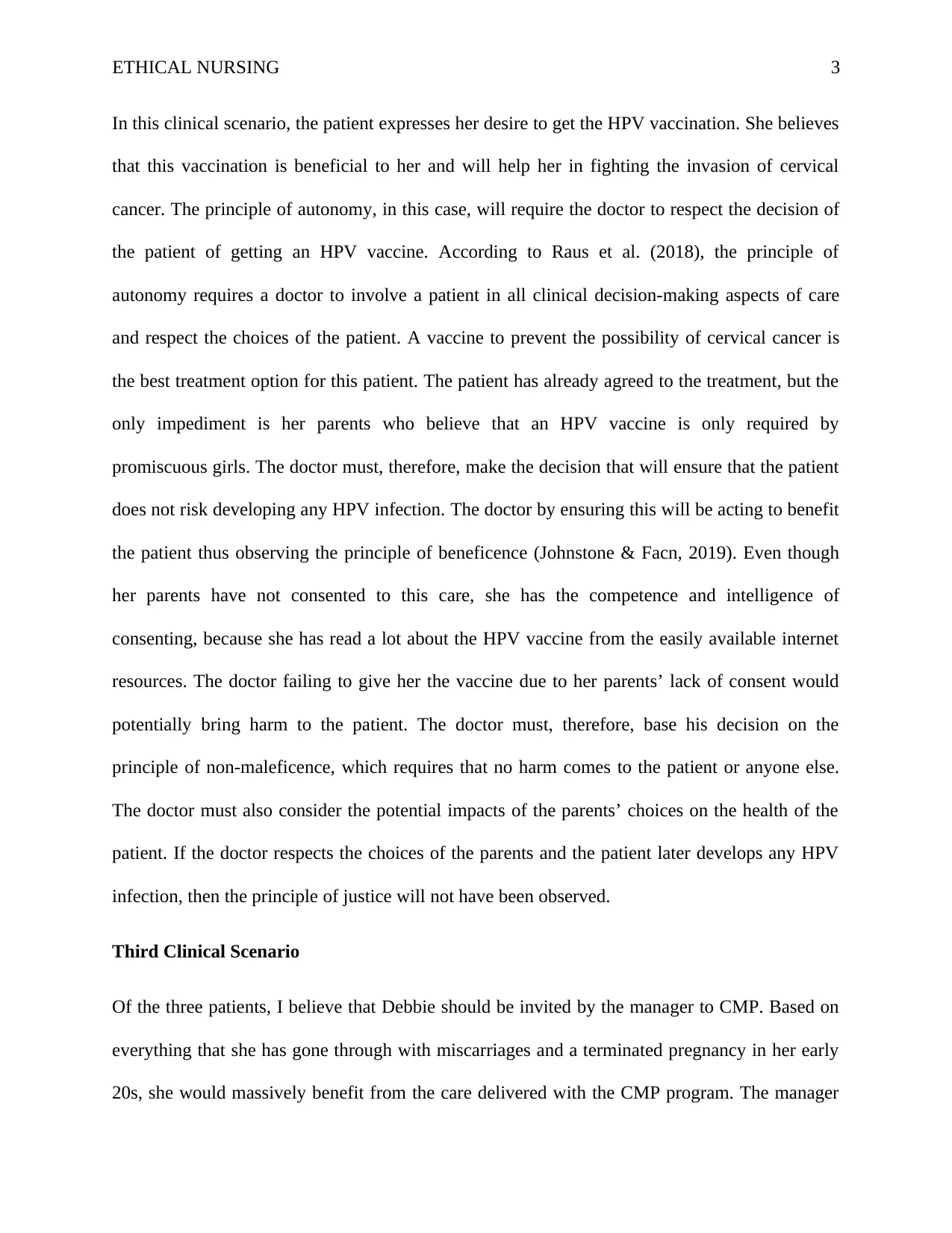
ETHICAL NURSING 3
In this clinical scenario, the patient expresses her desire to get the HPV vaccination. She believes
that this vaccination is beneficial to her and will help her in fighting the invasion of cervical
cancer. The principle of autonomy, in this case, will require the doctor to respect the decision of
the patient of getting an HPV vaccine. According to Raus et al. (2018), the principle of
autonomy requires a doctor to involve a patient in all clinical decision-making aspects of care
and respect the choices of the patient. A vaccine to prevent the possibility of cervical cancer is
the best treatment option for this patient. The patient has already agreed to the treatment, but the
only impediment is her parents who believe that an HPV vaccine is only required by
promiscuous girls. The doctor must, therefore, make the decision that will ensure that the patient
does not risk developing any HPV infection. The doctor by ensuring this will be acting to benefit
the patient thus observing the principle of beneficence (Johnstone & Facn, 2019). Even though
her parents have not consented to this care, she has the competence and intelligence of
consenting, because she has read a lot about the HPV vaccine from the easily available internet
resources. The doctor failing to give her the vaccine due to her parents’ lack of consent would
potentially bring harm to the patient. The doctor must, therefore, base his decision on the
principle of non-maleficence, which requires that no harm comes to the patient or anyone else.
The doctor must also consider the potential impacts of the parents’ choices on the health of the
patient. If the doctor respects the choices of the parents and the patient later develops any HPV
infection, then the principle of justice will not have been observed.
Third Clinical Scenario
Of the three patients, I believe that Debbie should be invited by the manager to CMP. Based on
everything that she has gone through with miscarriages and a terminated pregnancy in her early
20s, she would massively benefit from the care delivered with the CMP program. The manager
In this clinical scenario, the patient expresses her desire to get the HPV vaccination. She believes
that this vaccination is beneficial to her and will help her in fighting the invasion of cervical
cancer. The principle of autonomy, in this case, will require the doctor to respect the decision of
the patient of getting an HPV vaccine. According to Raus et al. (2018), the principle of
autonomy requires a doctor to involve a patient in all clinical decision-making aspects of care
and respect the choices of the patient. A vaccine to prevent the possibility of cervical cancer is
the best treatment option for this patient. The patient has already agreed to the treatment, but the
only impediment is her parents who believe that an HPV vaccine is only required by
promiscuous girls. The doctor must, therefore, make the decision that will ensure that the patient
does not risk developing any HPV infection. The doctor by ensuring this will be acting to benefit
the patient thus observing the principle of beneficence (Johnstone & Facn, 2019). Even though
her parents have not consented to this care, she has the competence and intelligence of
consenting, because she has read a lot about the HPV vaccine from the easily available internet
resources. The doctor failing to give her the vaccine due to her parents’ lack of consent would
potentially bring harm to the patient. The doctor must, therefore, base his decision on the
principle of non-maleficence, which requires that no harm comes to the patient or anyone else.
The doctor must also consider the potential impacts of the parents’ choices on the health of the
patient. If the doctor respects the choices of the parents and the patient later develops any HPV
infection, then the principle of justice will not have been observed.
Third Clinical Scenario
Of the three patients, I believe that Debbie should be invited by the manager to CMP. Based on
everything that she has gone through with miscarriages and a terminated pregnancy in her early
20s, she would massively benefit from the care delivered with the CMP program. The manager
⊘ This is a preview!⊘
Do you want full access?
Subscribe today to unlock all pages.

Trusted by 1+ million students worldwide
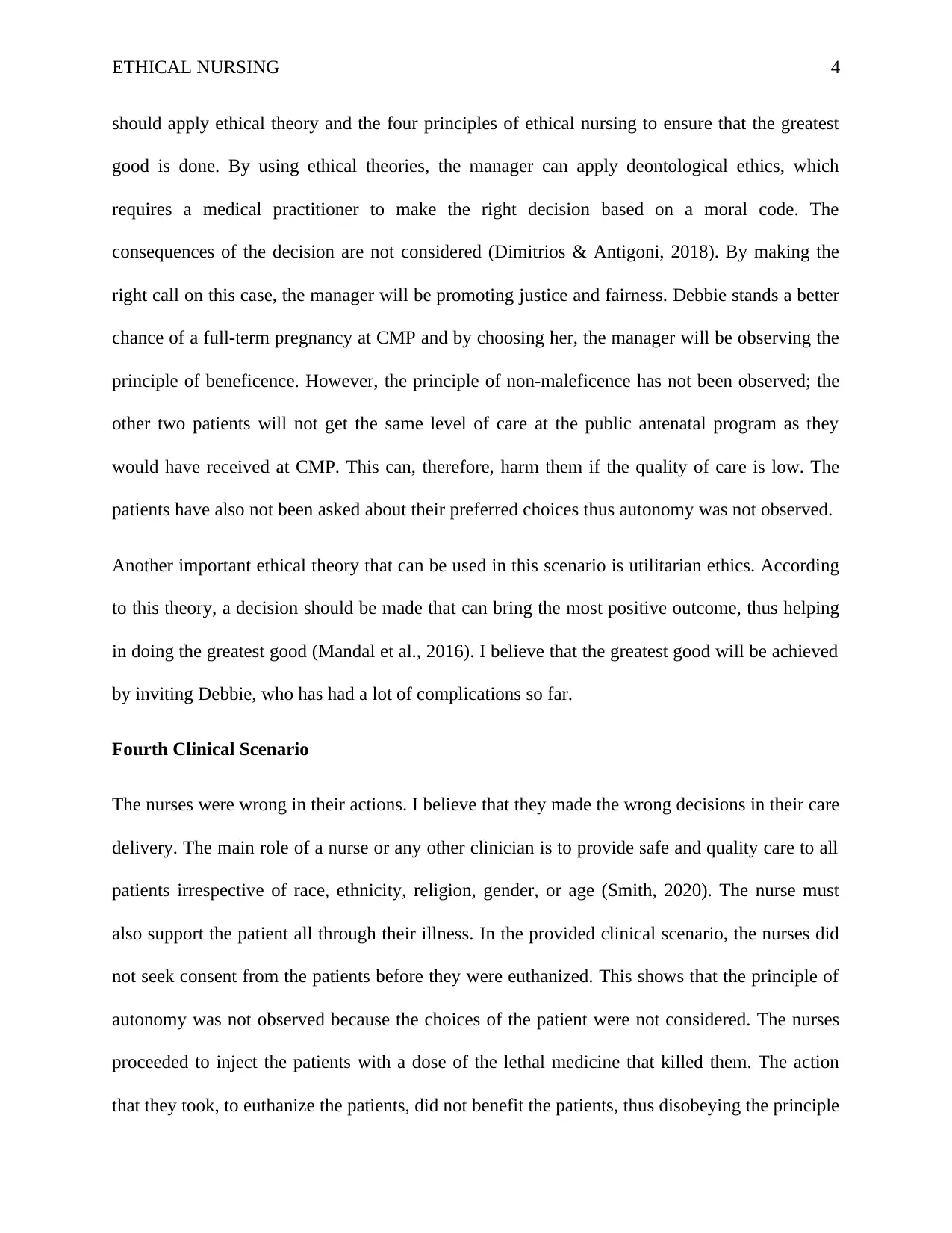
ETHICAL NURSING 4
should apply ethical theory and the four principles of ethical nursing to ensure that the greatest
good is done. By using ethical theories, the manager can apply deontological ethics, which
requires a medical practitioner to make the right decision based on a moral code. The
consequences of the decision are not considered (Dimitrios & Antigoni, 2018). By making the
right call on this case, the manager will be promoting justice and fairness. Debbie stands a better
chance of a full-term pregnancy at CMP and by choosing her, the manager will be observing the
principle of beneficence. However, the principle of non-maleficence has not been observed; the
other two patients will not get the same level of care at the public antenatal program as they
would have received at CMP. This can, therefore, harm them if the quality of care is low. The
patients have also not been asked about their preferred choices thus autonomy was not observed.
Another important ethical theory that can be used in this scenario is utilitarian ethics. According
to this theory, a decision should be made that can bring the most positive outcome, thus helping
in doing the greatest good (Mandal et al., 2016). I believe that the greatest good will be achieved
by inviting Debbie, who has had a lot of complications so far.
Fourth Clinical Scenario
The nurses were wrong in their actions. I believe that they made the wrong decisions in their care
delivery. The main role of a nurse or any other clinician is to provide safe and quality care to all
patients irrespective of race, ethnicity, religion, gender, or age (Smith, 2020). The nurse must
also support the patient all through their illness. In the provided clinical scenario, the nurses did
not seek consent from the patients before they were euthanized. This shows that the principle of
autonomy was not observed because the choices of the patient were not considered. The nurses
proceeded to inject the patients with a dose of the lethal medicine that killed them. The action
that they took, to euthanize the patients, did not benefit the patients, thus disobeying the principle
should apply ethical theory and the four principles of ethical nursing to ensure that the greatest
good is done. By using ethical theories, the manager can apply deontological ethics, which
requires a medical practitioner to make the right decision based on a moral code. The
consequences of the decision are not considered (Dimitrios & Antigoni, 2018). By making the
right call on this case, the manager will be promoting justice and fairness. Debbie stands a better
chance of a full-term pregnancy at CMP and by choosing her, the manager will be observing the
principle of beneficence. However, the principle of non-maleficence has not been observed; the
other two patients will not get the same level of care at the public antenatal program as they
would have received at CMP. This can, therefore, harm them if the quality of care is low. The
patients have also not been asked about their preferred choices thus autonomy was not observed.
Another important ethical theory that can be used in this scenario is utilitarian ethics. According
to this theory, a decision should be made that can bring the most positive outcome, thus helping
in doing the greatest good (Mandal et al., 2016). I believe that the greatest good will be achieved
by inviting Debbie, who has had a lot of complications so far.
Fourth Clinical Scenario
The nurses were wrong in their actions. I believe that they made the wrong decisions in their care
delivery. The main role of a nurse or any other clinician is to provide safe and quality care to all
patients irrespective of race, ethnicity, religion, gender, or age (Smith, 2020). The nurse must
also support the patient all through their illness. In the provided clinical scenario, the nurses did
not seek consent from the patients before they were euthanized. This shows that the principle of
autonomy was not observed because the choices of the patient were not considered. The nurses
proceeded to inject the patients with a dose of the lethal medicine that killed them. The action
that they took, to euthanize the patients, did not benefit the patients, thus disobeying the principle
Paraphrase This Document
Need a fresh take? Get an instant paraphrase of this document with our AI Paraphraser
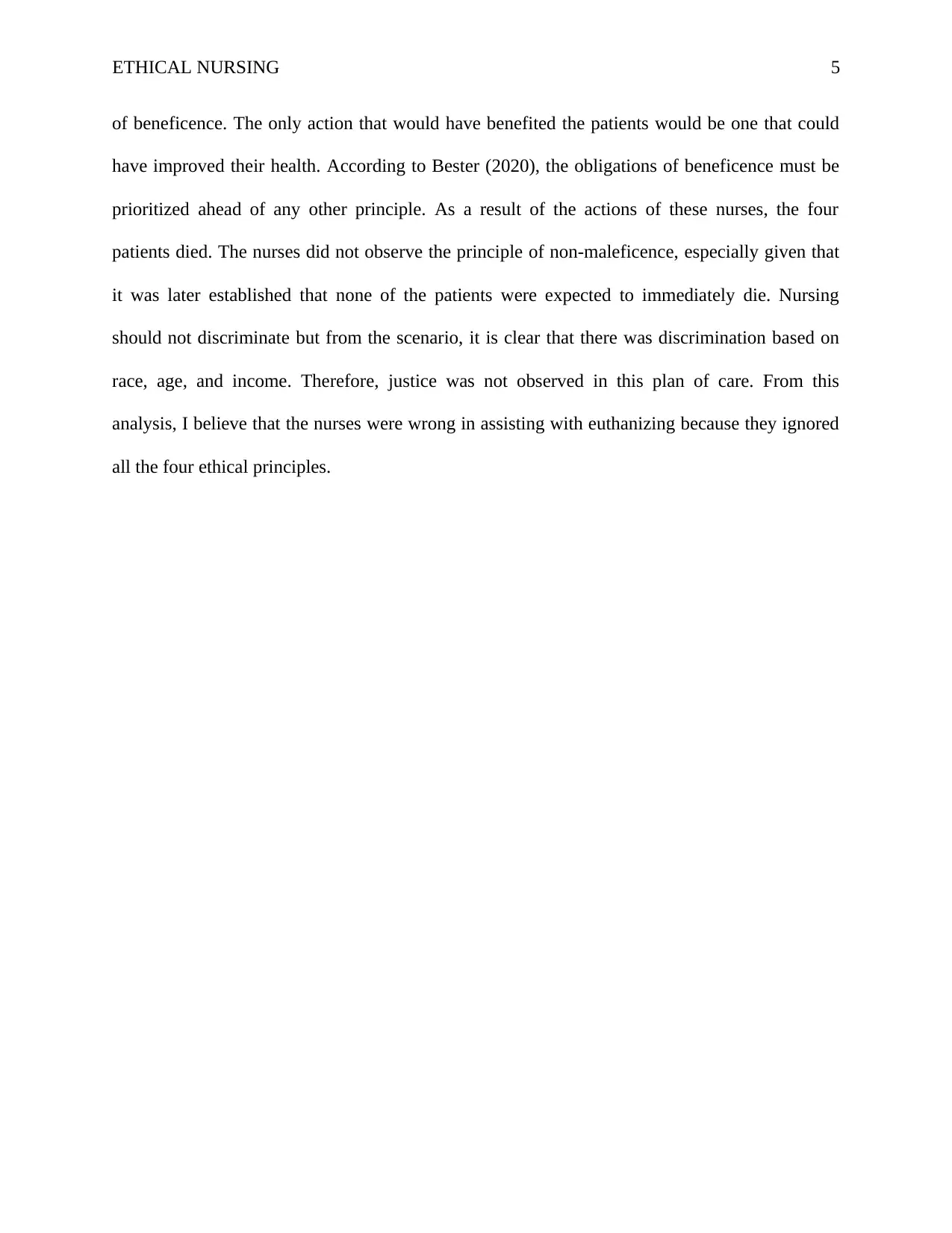
ETHICAL NURSING 5
of beneficence. The only action that would have benefited the patients would be one that could
have improved their health. According to Bester (2020), the obligations of beneficence must be
prioritized ahead of any other principle. As a result of the actions of these nurses, the four
patients died. The nurses did not observe the principle of non-maleficence, especially given that
it was later established that none of the patients were expected to immediately die. Nursing
should not discriminate but from the scenario, it is clear that there was discrimination based on
race, age, and income. Therefore, justice was not observed in this plan of care. From this
analysis, I believe that the nurses were wrong in assisting with euthanizing because they ignored
all the four ethical principles.
of beneficence. The only action that would have benefited the patients would be one that could
have improved their health. According to Bester (2020), the obligations of beneficence must be
prioritized ahead of any other principle. As a result of the actions of these nurses, the four
patients died. The nurses did not observe the principle of non-maleficence, especially given that
it was later established that none of the patients were expected to immediately die. Nursing
should not discriminate but from the scenario, it is clear that there was discrimination based on
race, age, and income. Therefore, justice was not observed in this plan of care. From this
analysis, I believe that the nurses were wrong in assisting with euthanizing because they ignored
all the four ethical principles.
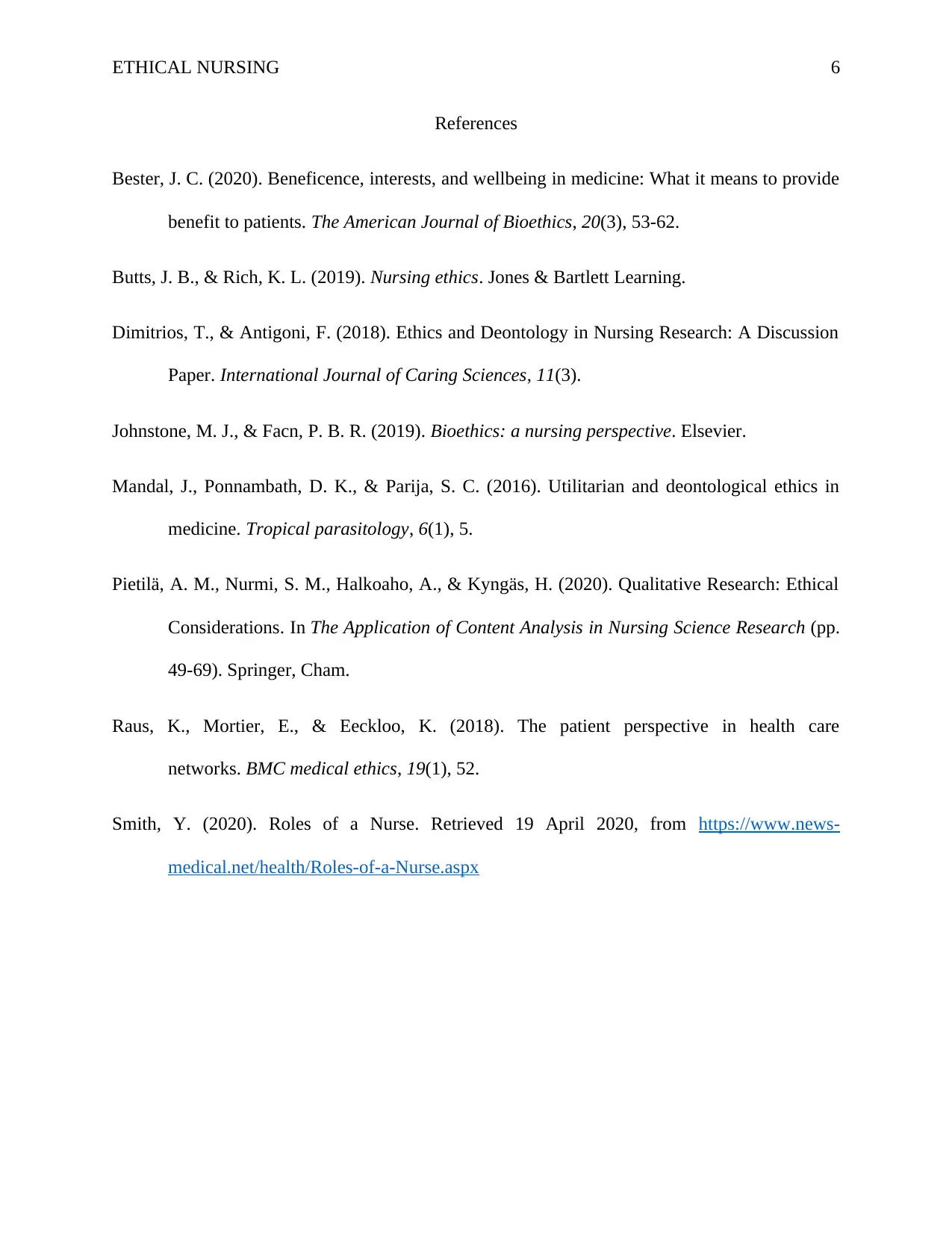
ETHICAL NURSING 6
References
Bester, J. C. (2020). Beneficence, interests, and wellbeing in medicine: What it means to provide
benefit to patients. The American Journal of Bioethics, 20(3), 53-62.
Butts, J. B., & Rich, K. L. (2019). Nursing ethics. Jones & Bartlett Learning.
Dimitrios, T., & Antigoni, F. (2018). Ethics and Deontology in Nursing Research: A Discussion
Paper. International Journal of Caring Sciences, 11(3).
Johnstone, M. J., & Facn, P. B. R. (2019). Bioethics: a nursing perspective. Elsevier.
Mandal, J., Ponnambath, D. K., & Parija, S. C. (2016). Utilitarian and deontological ethics in
medicine. Tropical parasitology, 6(1), 5.
Pietilä, A. M., Nurmi, S. M., Halkoaho, A., & Kyngäs, H. (2020). Qualitative Research: Ethical
Considerations. In The Application of Content Analysis in Nursing Science Research (pp.
49-69). Springer, Cham.
Raus, K., Mortier, E., & Eeckloo, K. (2018). The patient perspective in health care
networks. BMC medical ethics, 19(1), 52.
Smith, Y. (2020). Roles of a Nurse. Retrieved 19 April 2020, from https://www.news-
medical.net/health/Roles-of-a-Nurse.aspx
References
Bester, J. C. (2020). Beneficence, interests, and wellbeing in medicine: What it means to provide
benefit to patients. The American Journal of Bioethics, 20(3), 53-62.
Butts, J. B., & Rich, K. L. (2019). Nursing ethics. Jones & Bartlett Learning.
Dimitrios, T., & Antigoni, F. (2018). Ethics and Deontology in Nursing Research: A Discussion
Paper. International Journal of Caring Sciences, 11(3).
Johnstone, M. J., & Facn, P. B. R. (2019). Bioethics: a nursing perspective. Elsevier.
Mandal, J., Ponnambath, D. K., & Parija, S. C. (2016). Utilitarian and deontological ethics in
medicine. Tropical parasitology, 6(1), 5.
Pietilä, A. M., Nurmi, S. M., Halkoaho, A., & Kyngäs, H. (2020). Qualitative Research: Ethical
Considerations. In The Application of Content Analysis in Nursing Science Research (pp.
49-69). Springer, Cham.
Raus, K., Mortier, E., & Eeckloo, K. (2018). The patient perspective in health care
networks. BMC medical ethics, 19(1), 52.
Smith, Y. (2020). Roles of a Nurse. Retrieved 19 April 2020, from https://www.news-
medical.net/health/Roles-of-a-Nurse.aspx
⊘ This is a preview!⊘
Do you want full access?
Subscribe today to unlock all pages.

Trusted by 1+ million students worldwide
1 out of 6
Related Documents
Your All-in-One AI-Powered Toolkit for Academic Success.
+13062052269
info@desklib.com
Available 24*7 on WhatsApp / Email
![[object Object]](/_next/static/media/star-bottom.7253800d.svg)
Unlock your academic potential
Copyright © 2020–2025 A2Z Services. All Rights Reserved. Developed and managed by ZUCOL.





